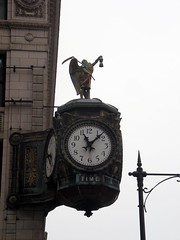March 07, 2009
Watching Watchmen
 I saw Watchmen tonight - I can even claim it was research, since I'm doing a small piece on the ethics of the novel. Some comments:
I saw Watchmen tonight - I can even claim it was research, since I'm doing a small piece on the ethics of the novel. Some comments:
- The worldbuilding was largely impeccable. Except for glaring details like the lack of smoking due to health censorship.
- Yet the parts where the movie really shines is when it deviates from the novel. There is much to be said for uncertainty and indeterminism, at least in an action story.
- The problem is that the rigid, interlocking clockwork structure of the novel disappears. This is of course because it is nearly impossible to transfer to film. The reflections, recurring symbols, interleaving etc. certainly can be done on film, but the sheer density would totally smother the story in this case. Unfortunately I think that without the structure much is lost: the structure of the film is like seeing the blurred outlines of a wettened blueprint that had once been precise.
- So the dilemma is that following the novel would make a boring, possibly unwatchable movie. Leaving the novel gives it life, but loses the core.
- I have always loved the portrait of Dr Manhattan's sense of time in the novel. He lives within Einstein's "block time" deterministic crystal of causality, seeing everything yet constrained by what he knows will be his future. No warm and fuzzy "love conquers all" or free will, just consistency. I think this is largely a correct view of the universe, except that everything is going on within a many-worlds multiverse rather than a single crystal.
- Unfortunately the confused "thermodynamic miracle" explanation for why to care for humans remain. As it stands, it is like being amazed of getting the particular poker hand one got out of all the possibilities - a trivial observation, and applicable to any macroscopic system, not just humans. A better take would be to recognize the enormous level of contingency of humans. Humans are highly specific structures with internal consistency and meaning, yet enormously variable and history-dependent. Most arrangements of quarks and leptons lack these properties.
- Using Philip Glass music for Dr Manhattan was perfect - timefree, alien and from the right era. While some of the background music is too clever and dominant (not always wrong; Rex Tremendae Majestatis had me grinning widely) this is exactly right.
- Not sure with the CG depiction of Dr Manhattan and his clockwork palace. On one hand they probably shouldn't look too real - the Dr isn't quite here, so to say - but sometimes it just looked like old computer graphics. Maintaining both the realism and the otherworldliness was a challenge I don't think succeeded.
- The big change in the plot actually makes sense. I can imagine a five year child telling the villain after he explained his original plan "But nobody will fall for that!" So he went back to the drawing board and came up with a much more plausible Big Bad, which also strengthens many otherwise weak plot threads.
- The computers were correctly 80's, except that I doubt Ozymandias would be using his mac in reverse mode. The biggest anachronism was probably the fingerprint detection on Night Owl's glasses.
- It is curious how dated the cold war threat feels today. I do not go to bed like I did in the 80's thinking that the missiles could already be in the air. Yet the stockpiles largely remain, the systems are likely as crufty as before, mistakes happen and the stabilization due to the MAD doctrine might be dissolving in a polycentric world. It is exhilarating to consider that a fundamental, almost defining, feature of the world as we experience it can dissolve into history over less than a generation. And people think we transhumanists are absurdly optimistic about how different the future can be.
Was it an evening well spent? Yes. What, in life, does not deserve celebrating?
Posted by Anders3 at March 7, 2009 03:49 AMComments